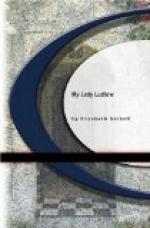Mr. Horner was a very faithful steward, and very respectful to my lady; although sometimes, I thought she was sharper to him than to any one else; perhaps because she knew that, although he never said anything, he disapproved of the Hanburys being made to pay for the Earl Ludlow’s estates and state.
The late lord had been a sailor, and had been as extravagant in his habits as most sailors are, I am told,—for I never saw the sea; and yet he had a long sight to his own interests; but whatever he was, my lady loved him and his memory, with about as fond and proud a love as ever wife gave husband, I should think.
For a part of his life Mr. Horner, who was born on the Hanbury property, had been a clerk to an attorney in Birmingham; and these few years had given him a kind of worldly wisdom, which, though always exerted for her benefit, was antipathetic to her ladyship, who thought that some of her steward’s maxims savoured of trade and commerce. I fancy that if it had been possible, she would have preferred a return to the primitive system, of living on the produce of the land, and exchanging the surplus for such articles as were needed, without the intervention of money.
But Mr. Horner was bitten with new-fangled notions, as she would say, though his new-fangled notions were what folk at the present day would think sadly behindhand; and some of Mr. Gray’s ideas fell on Mr. Horner’s mind like sparks on tow, though they started from two different points. Mr. Horner wanted to make every man useful and active in this world, and to direct as much activity and usefulness as possible to the improvement of the Hanbury estates, and the aggrandisement of the Hanbury family, and therefore he fell into the new cry for education.
Mr. Gray did not care much,—Mr. Horner thought not enough,—for this world, and where any man or family stood in their earthly position; but he would have every one prepared for the world to come, and capable of understanding and receiving certain doctrines, for which latter purpose, it stands to reason, he must have heard of these doctrines; and therefore Mr. Gray wanted education. The answer in the Catechism that Mr. Horner was most fond of calling upon a child to repeat, was that to, “What is thy duty towards thy neighbour?” The answer Mr. Gray liked best to hear repeated with unction, was that to the question, “What is the inward and spiritual grace?” The reply to which Lady Ludlow bent her head the lowest, as we said our Catechism to her on Sundays, was to, “What is thy duty towards God?” But neither Mr. Horner nor Mr. Gray had heard many answers to the Catechism as yet.
Up to this time there was no Sunday-school in Hanbury. Mr. Gray’s desires were bounded by that object. Mr. Horner looked farther on: he hoped for a day-school at some future time, to train up intelligent labourers for working on the estate. My lady would hear of neither one nor the other: indeed, not the boldest man whom she ever saw would have dared to name the project of a day-school within her hearing.




